Unlocking Hidden Collections: The Richard D. Ryder Archive
Learn about the pioneering animal welfare campaigner Dr Richard D. Ryder through his newly-catalogued archive.
8 October 2025Learn about the pioneering animal welfare campaigner Dr Richard D. Ryder through his newly-catalogued archive.
8 October 2025Blog series Social Science
Author Amy Palmer, manuscripts cataloguer working on the British Library’s Unlocking Hidden Collections project
Dr Richard D. Ryder (b 1940) is a prominent UK campaigner for animal welfare. He has had a long involvement with the Royal Society for the Prevention of Cruelty to Animals (RSPCA). He was a council member for many decades and served as vice-chairman and chairman.
Ryder was employed as a political lobbyist for animals in the 1990s and stood for election as a member of parliament. He is also the author of a substantial number of well-known academic works. The British library holds the Ryder archive, which I have been cataloguing since October 2024 and will be completing by March 2026.
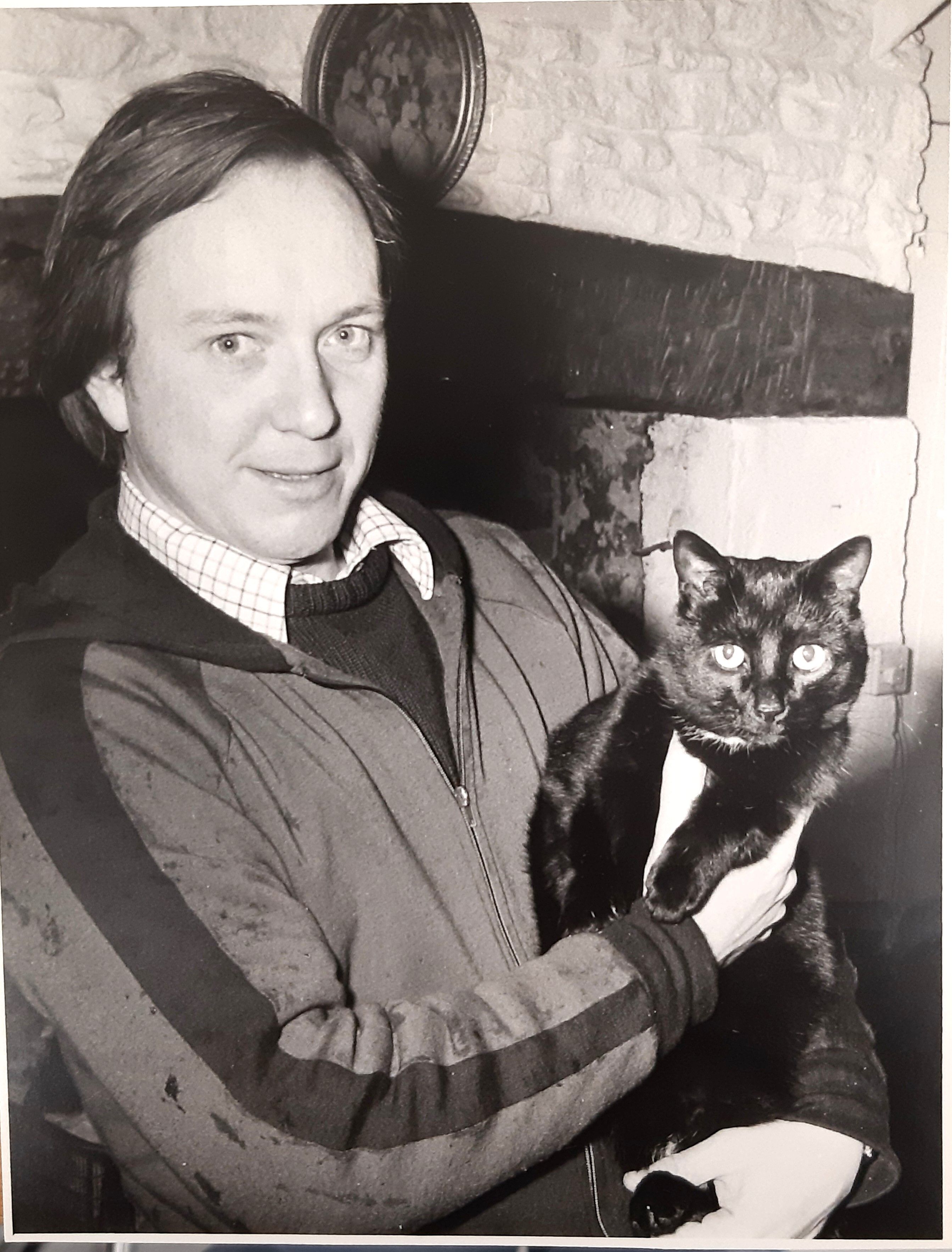
Photographs of Dr Richard D. Ryder [1979 and undated], Dep 9846 & Dep 10275, Credit: © Dr Richard Dudley Ryder, 2025
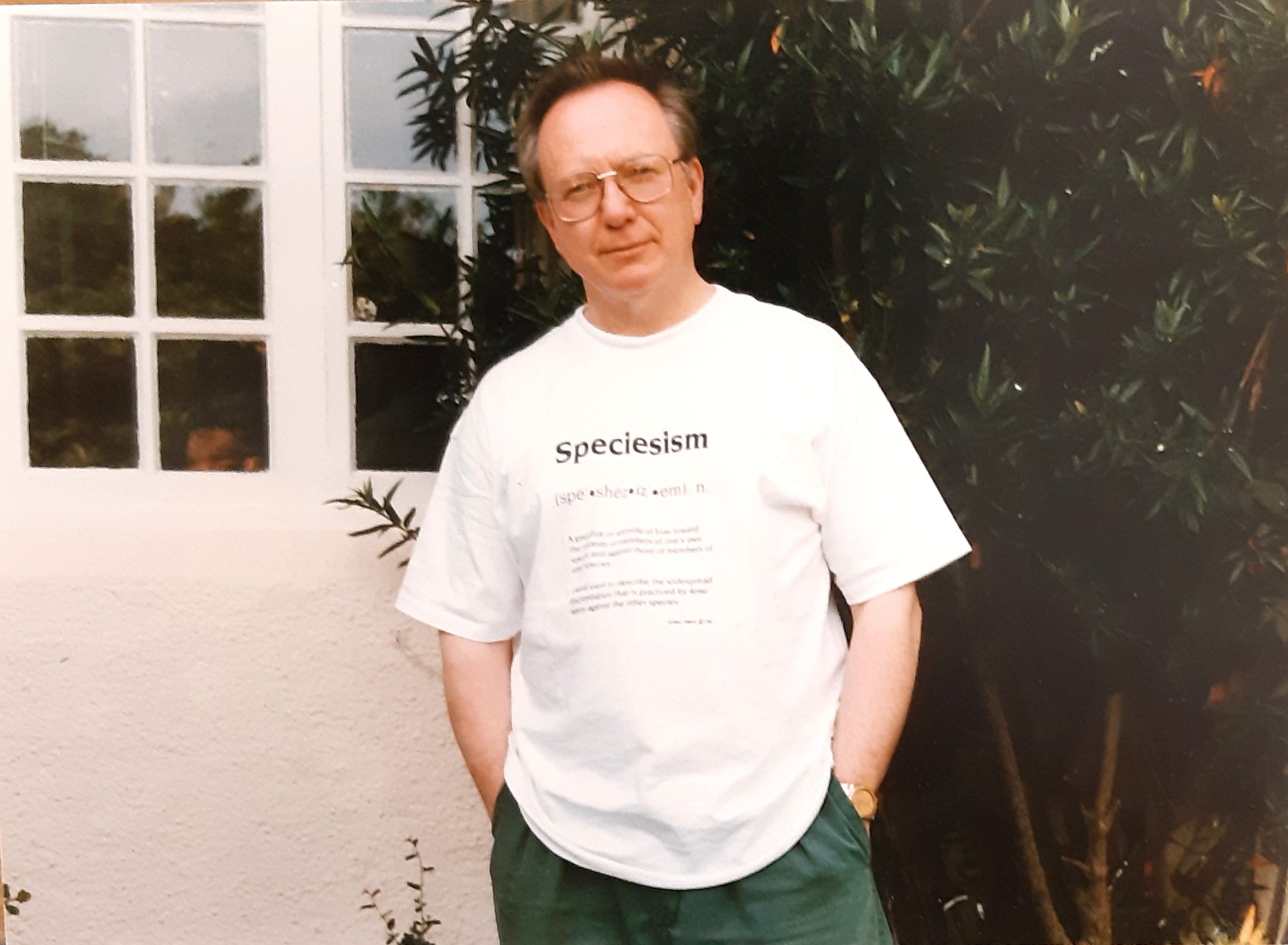
One substantial series of material relates to Ryder’s work with the RSPCA, with a focus on the charity’s internal workings. In 1982, V.S. Pritchett described Ryder as ‘the stormy petrel of the RSPCA’, meaning that he was a disrupter and moderniser.
This delighted Ryder, and he subsequently used the quote on CVs. He was part of a group that wanted the charity to use its voice to push for legislation on animal welfare issues, rather than just concentrate on the day-to-day work of running rescue and rehoming centres.
Researchers may be interested in the challenges involved in this re-alignment, including the conflicts with the regulatory body, the Charity Commission, which sought to prevent charities spending money on political campaigns.
Ryder’s frustrations with the charity regulations influenced his decision to work under the auspices of the Political Animal Lobby (PAL) from 1991 to 1997. PAL was a subsidiary of the International Fund for Animal Welfare (IFAW). It was not a charity and was thus free to campaign on any issues. Its stated aim was to put animals into politics, as its headed notepaper with the line of animals entering parliament demonstrates. Ryder was certainly successful in building relationships with politicians across the spectrum, as a vast amount of correspondence in his archive testifies.
He focused his energies on the most influential ministers and party leaders and made significant donations to all the major parties. He hoped that this would raise the profile of animal welfare issues and lead to manifesto commitments. Parties made clear, however, that specific policy changes could not be ‘bought’.
The series of papers related to PAL offers much material for reflection on the lobbying processes in the UK, which are perhaps not as well understood and openly discussed as those in the USA.
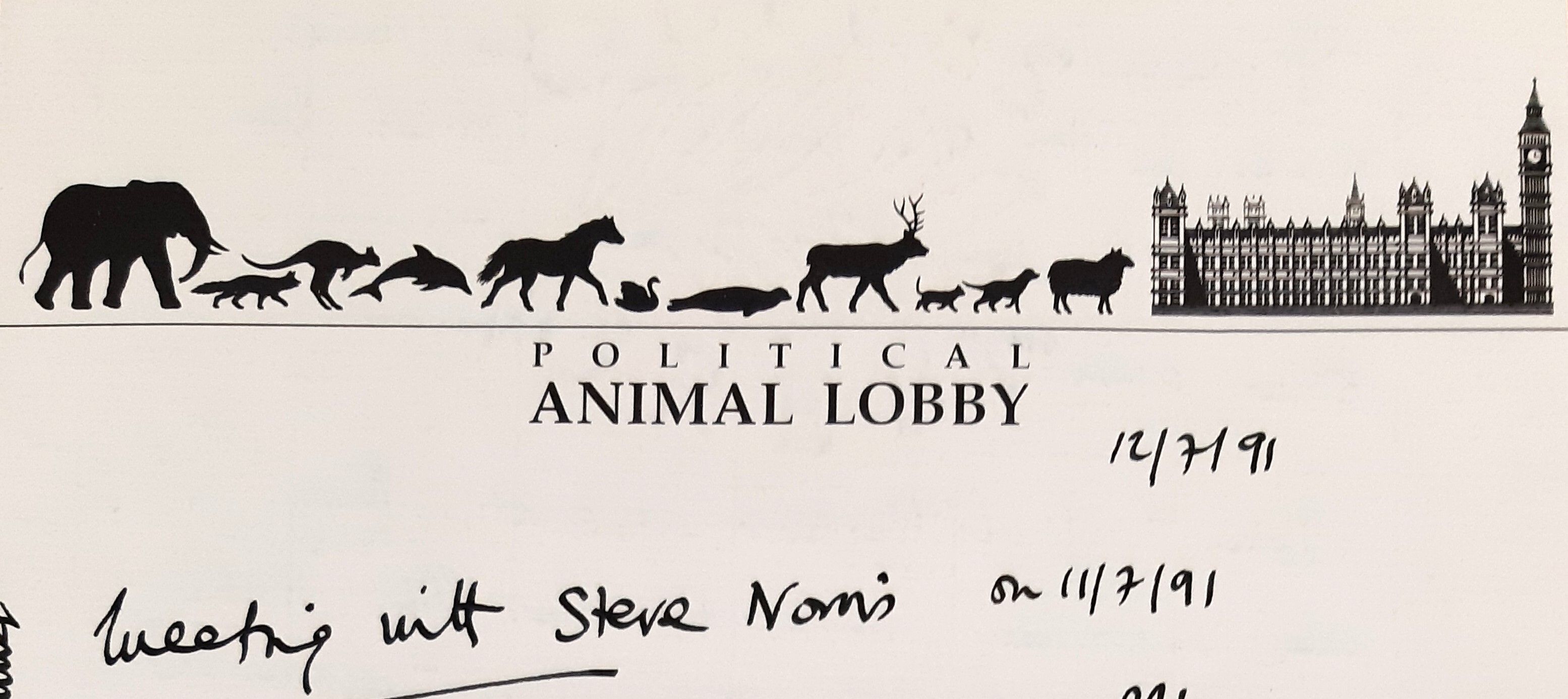
An example of PAL-headed notepaper, used here to record notes of a meeting with Conservative MP Steve Norris [1991], Dep 9846 & Dep 10275, Credit: © Dr Richard Dudley Ryder, 2025.
One series of the archive demonstrates Ryder’s more direct involvement with politics. For many years he was active member of the Liberal party (which later became the Liberal/SDP Alliance and then the Liberal Democrats) and stood as a parliamentary candidate in two general elections.
He served as chairman of the Liberal Animal Welfare group and wrote key policy documents for them, sometimes using the pseudonym ‘Jeremy Mill’, a name derived from two liberal philosophers who he admires: Jeremy Bentham and John Stuart Mill.
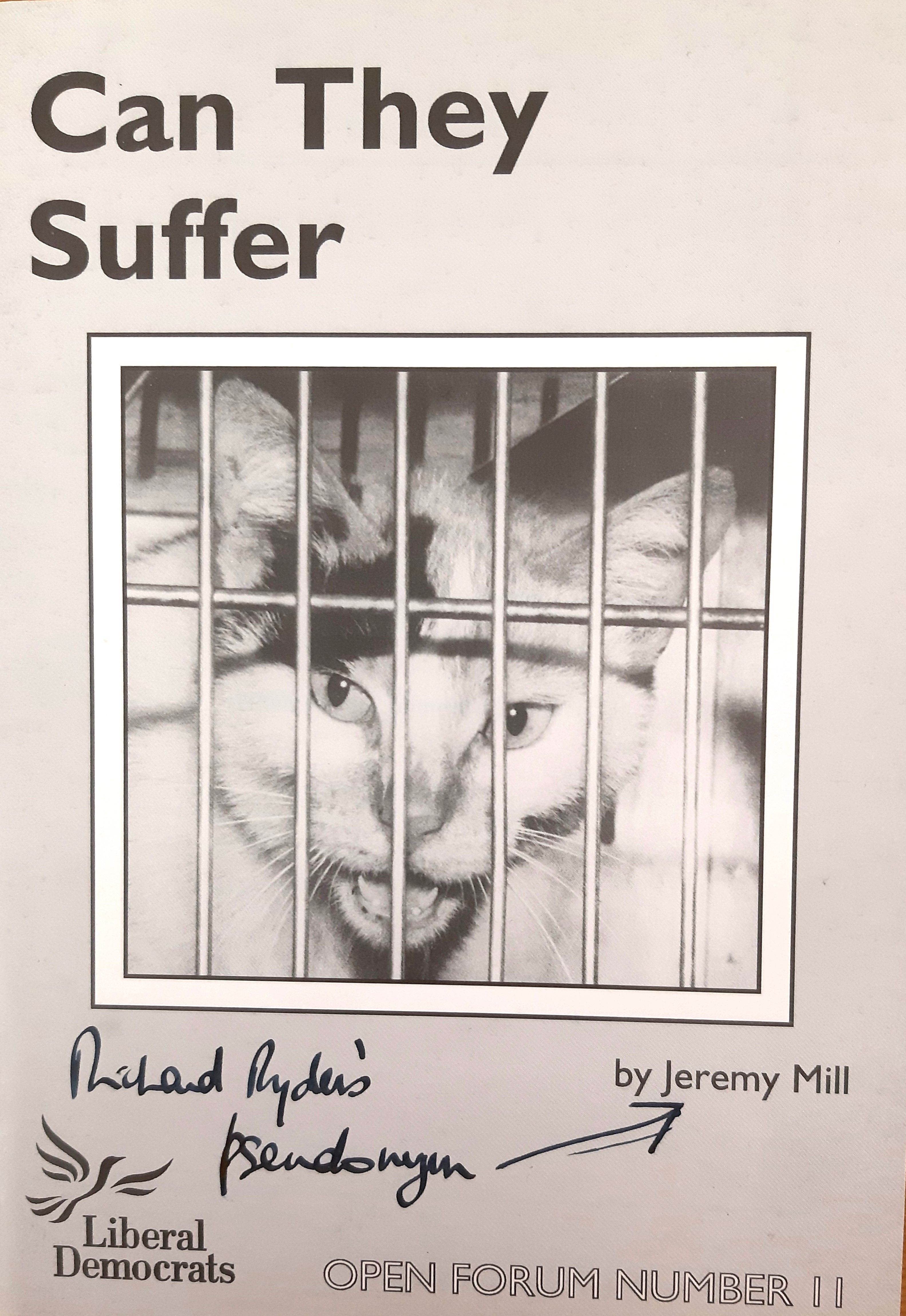
An annotated copy of ‘Can they Suffer’, a Liberal Democrat publication [1992], Dep 9846 & Dep 10275, Credit: © Liberal Democrats Party.
A large series in the archive is organised around animal welfare issues. Ryder has been involved in many different campaigns and one of his earliest concerns was for otters in his local area. In the late 1960s and the 1970s he took part in demonstrations against otter hunting.
Having carried out animal experiments himself during his training as a psychologist, he became particularly passionate about the welfare of laboratory animals. He was adamant that many tests were unnecessary, particularly those on cosmetics and domestic products, which he believed were carried out primarily for commercial gain (as many suitable commodities were already available).
Nonetheless, he saw himself as a moderate, arguing that it would not be possible to stop all experiments immediately. The campaign against foxhunting was also something he was heavily involved in, particularly when the opportunities for political action seemed to be opening up. This series contains campaign materials from many different pressure groups, showing how they worked together – or sometimes failed to do so – and the kind of tactics that were used to undermine the opposition.
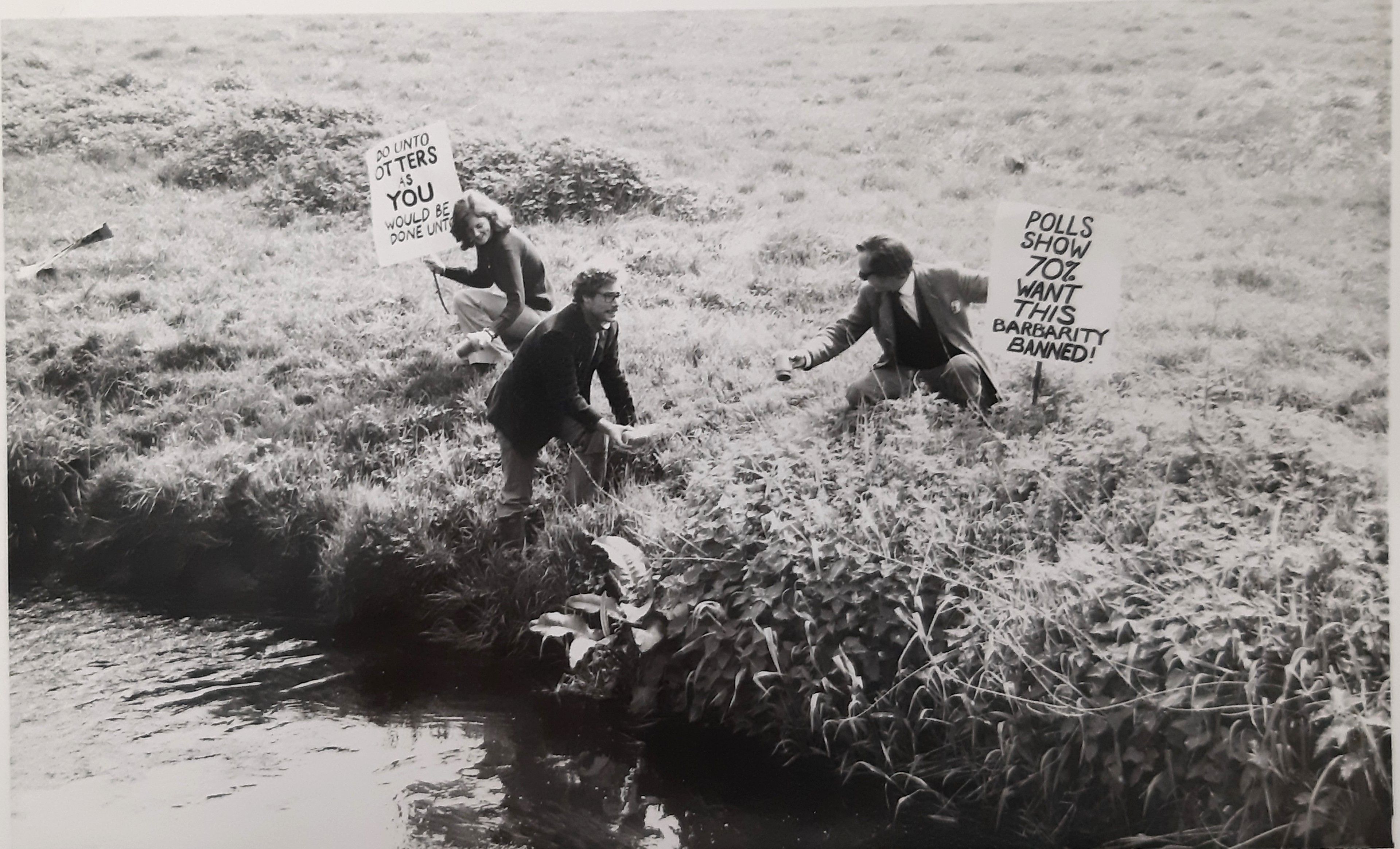
Ryder (far right) and friends protesting otter-hunting [c.1971], Dep 9846 & Dep 10275, Credit: © Dr Richard Dudley Ryder, 2025.
Ryder is also an academic and has written many books, articles, and short opinion pieces, including letters to newspapers, and has coined terms that have entered political discourse. The most famous of these is probably ‘speciesism’: a concept, which means treating some living being less favourably than others on the grounds of their species.
This is analogous to racism and sexism, although of course Ryder never argued that all species should be treated exactly the same. He also introduced the concept of ‘painism’, a belief that the most moral course of action in any given situation is the one which causes the least pain.
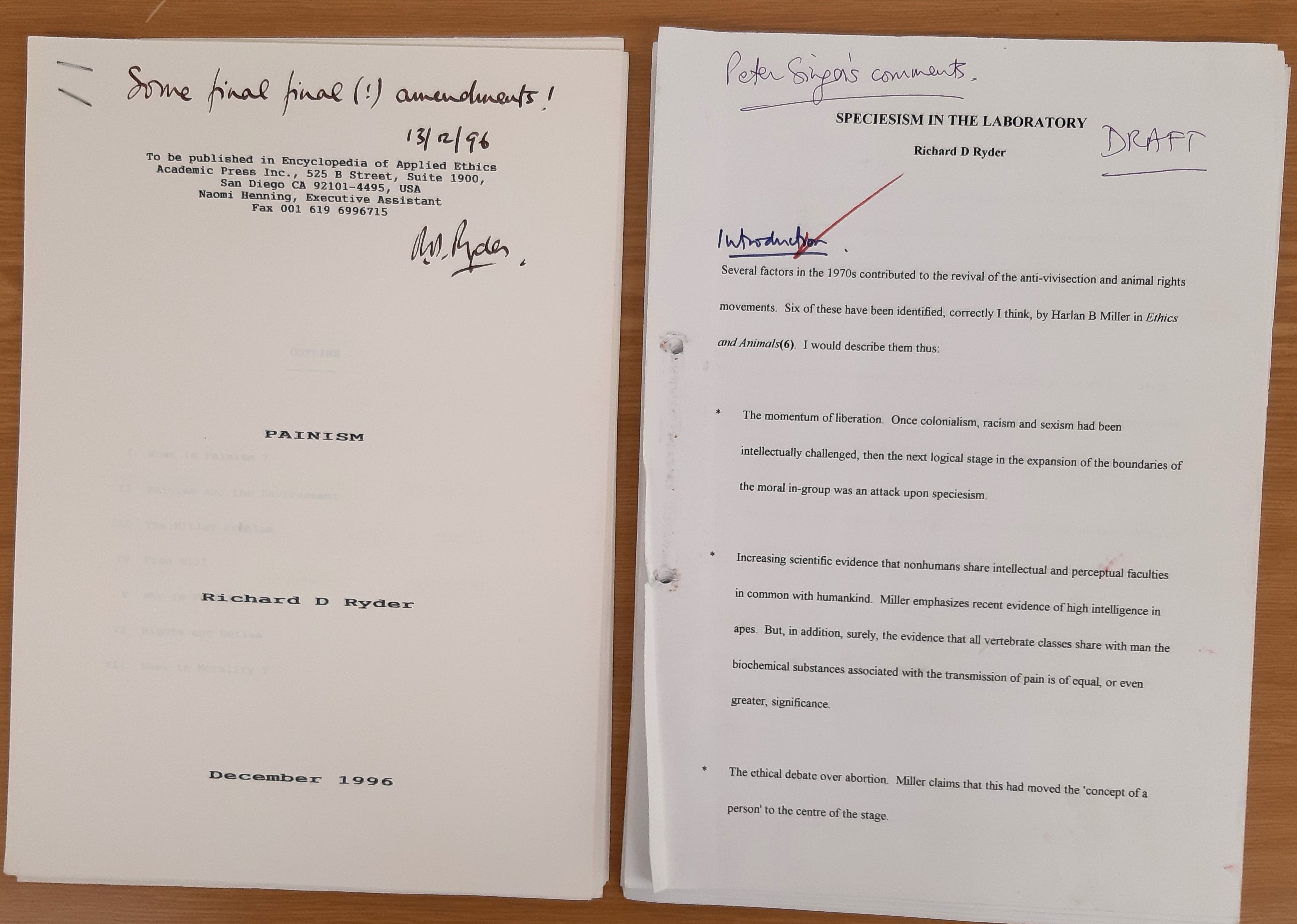
Annotated drafts of Ryder’s work, including one with comments from Peter Singer [1996], Dep 9846 & Dep 10275, Credit: © Dr Richard Dudley Ryder, 2025.
The quantity and diversity of Ryder’s correspondence is testament to the range of connections he had and suggests how central he has been to a web of animal activists. There are letters in the archive to and from fellow RSPCA members, including its one-time president, the author Richard Adams. There is also correspondence with people from a huge range of other groups and institutions and with international figures such as the Australian philosopher, Peter Singer, and the American theorist Tom Regan.
Perhaps most touchingly, there are some letters from young children, informing Ryder of cruelty to animals that they had witnessed. One young girl, writing in 1996, wrote that she and her brother had seen some people shooting at rabbits, pheasants and pigeons and how frightened the horses and cows were. The shooters went away when the children shouted at them. Ryder replied ‘Well done for helping the animals. Keep up the good work’.
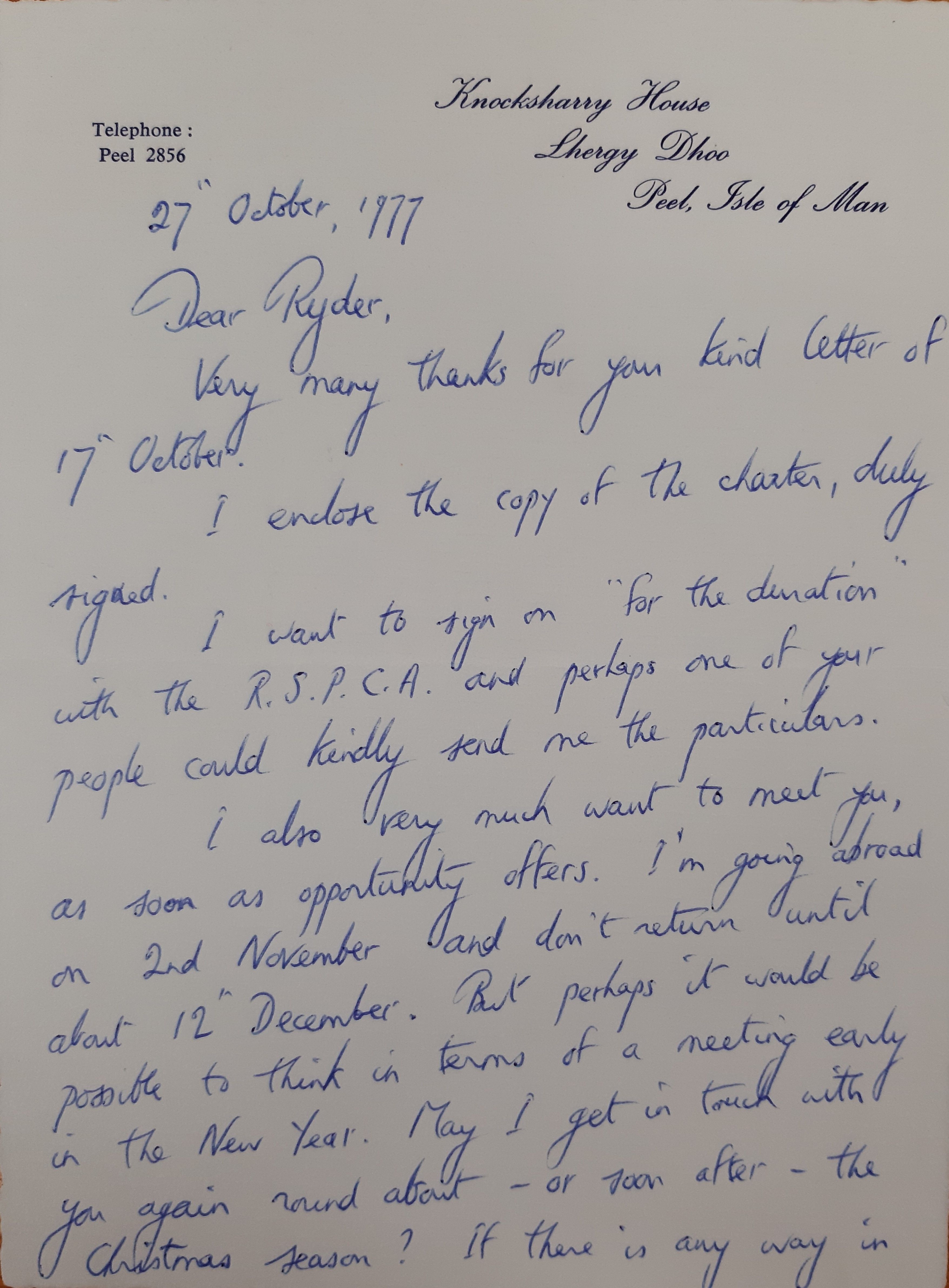
Letter to Ryder from the author, Richard Adams. Adams says that he admires Ryder’s work Victims of Science [1983], Dep 9846 & Dep 10275, Credit: © Watership Down Enterprises Ltd.
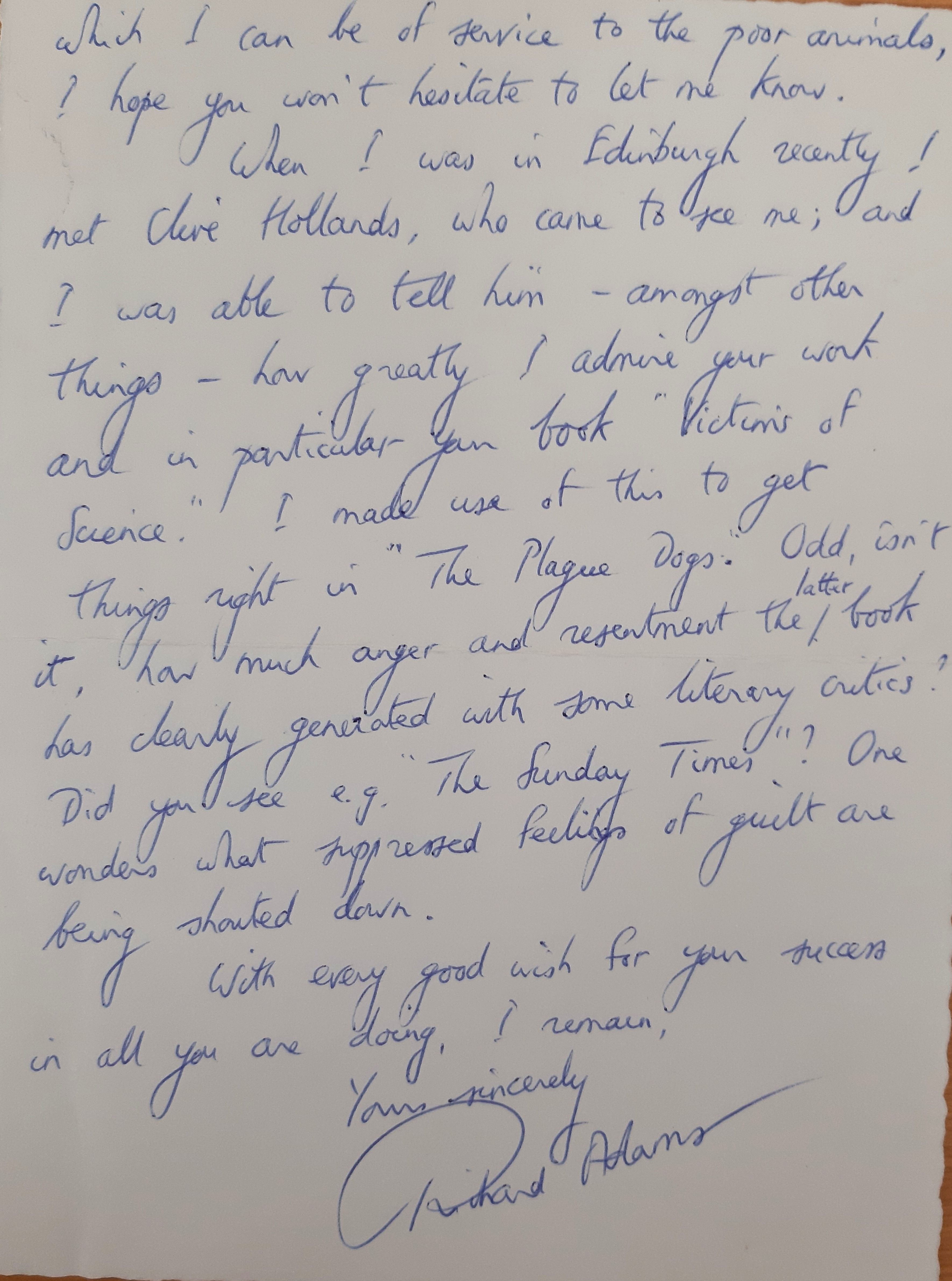
Ultimately, Ryder’s archive allows the researcher to explore whether it is possible to affect how society treats animals. In his 1998 application for IFAW Director, Ryder listed his ‘successful campaigns’.
He included some very concrete achievements, such as the introduction of European Union regulation of steel-toothed leg-hold traps, and some more obscure ones, such as protecting elephants. There is plenty of material here to appraise Ryder’s impact and consider how much difference one person can really make.
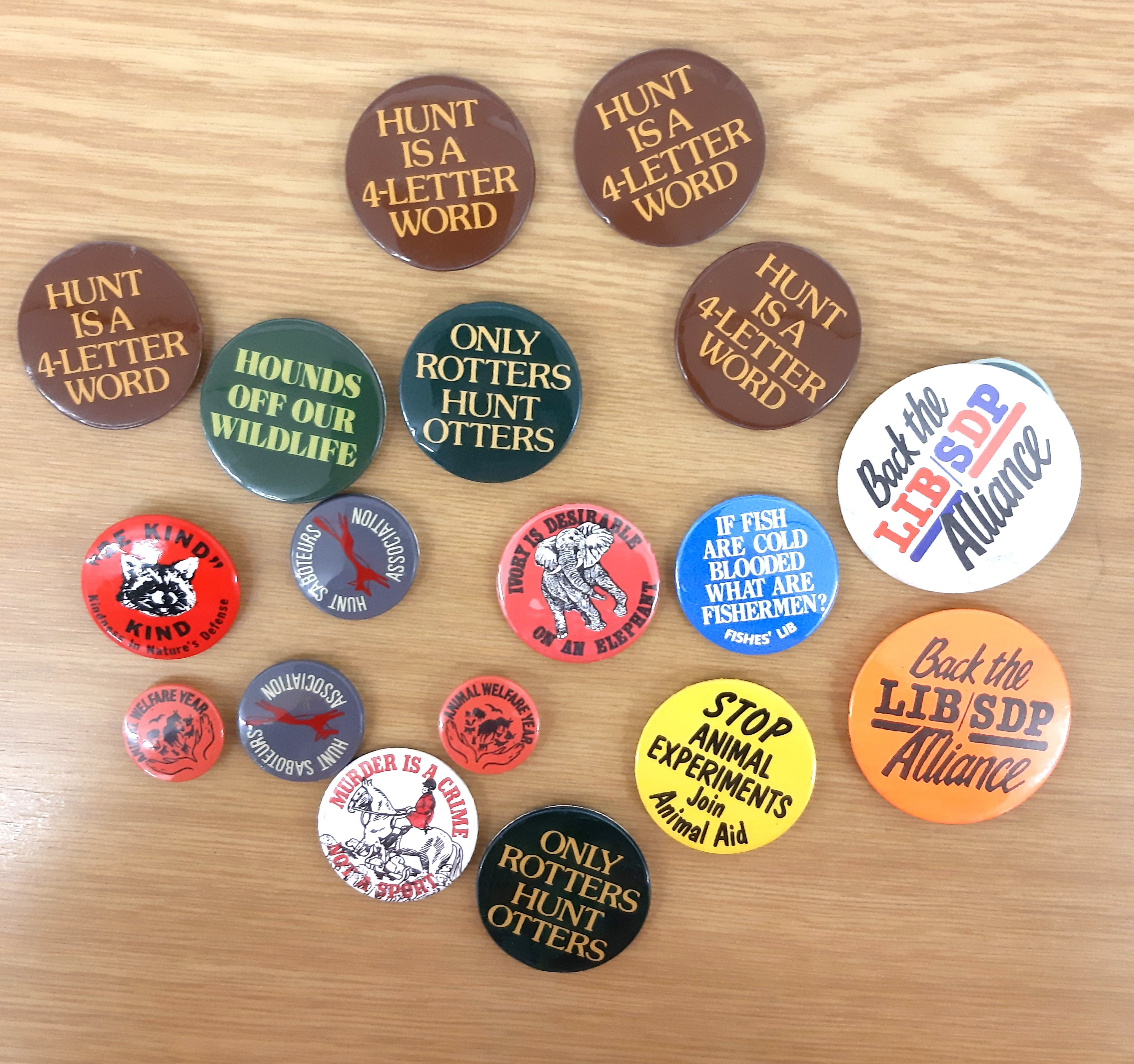
A selection of campaign badges, Dep 9846 & Dep 10275, Credit: © Dr Richard Dudley Ryder, 2025.
The Unlocking Hidden Collections project aims to process, research and catalogue the Library’s hidden collections, making them more accessible to researchers and the public.

You can access millions of collection items for free. Including books, newspapers, maps, sound recordings, photographs, patents and stamps.
Social science series
This blog is part of the social science blog series, highlighting collections, resources, projects and events at the British Library relevant to research in the social sciences. This includes politics, economics, sociology, law, cultural and media studies. Bloggers include our curators and also guest blogs by academics, students and practitioners.